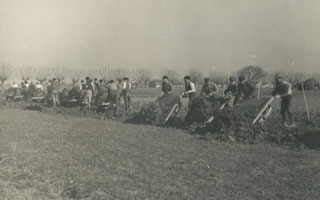Wage laborers and “wheel-barrowers”

The word “opera” (ovra) meant a day’s work in local parlance. By contract, the tenant farmer families owed a certain number of work days to their landowners and traded some with neighboring farms. In contrast, the families of wage laborers (brazzèint) earned their entire living as hired hands. In the dry crop areas, day laborers were hired with their own tools (scythe, sickle, spade, picket, shovel, wheel-barrow) by the landowners when there was extra work to be done such as digging out access roads in the fields (cavedagne) or preparing or removing rows of trees and grapevines. The tenant farmers also called upon day laborers when it was time for haymaking, harvesting and threshing grain, cultivating hemp and harvesting grapes on the family farms.
Landowners in the wet crop areas and rice paddies also hired wage laborers, often organized in teams led by a foreman (capurèl), for a number of tasks including gathering straw, turning over soil, harvesting rice and cutting hay. Hired hands were also of use to the public consortia that drained the marshland and for the administrators of reclamation works such as the digging of ditches, canals, river banks and streams.
The development of these public works in the 1800s and 1900s caused a strong but temporary increase in work for young and hardy men willing to serve as “wheel-barrowers”, in other words, to shovel and move soil in construction sites along the rivers and canals.